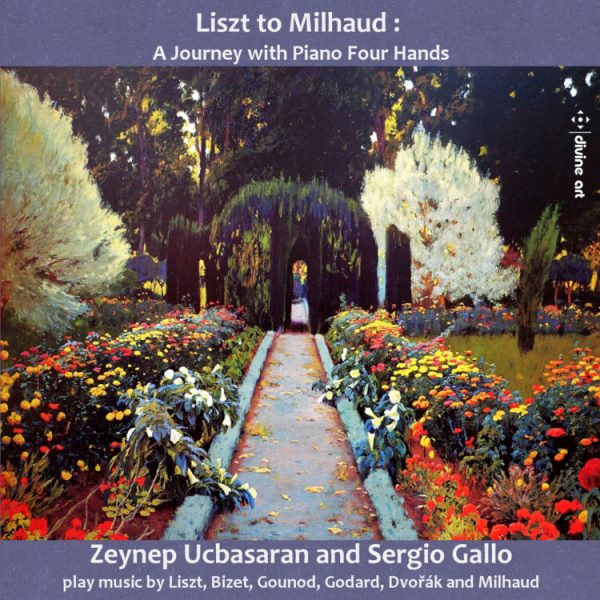American Record Guide
Piano duets, 4 hands at one piano, have attracted great composers since Mozart and Beethoven. Schubert brought the genre to another level with a vast quantity of great music. As the romantic era progressed, it fell to Liszt, Brahms, and Dvorak to add significant works to the repertoire. All along, there were tons of lesser composers writing original music and transcribing vast amounts of orchestral repertoire for piano duet. French composers enlarged the repertoire towards the end of the 1800s and into the early 1900s. By the mid 1900s and the proliferation of recorded music, the arrangements that were almost required to disseminate the music to a wider audience began to fade, although there are great arrangements of some Gershwin, Copland and Shostakovich for duet. The 2-piano idiom took over at that point for concert music by notable composers.
Here we get a well designed, enjoyable program that touches on most of what was mentioned above. Ucbasaran and Gallo have been an active duo for 15 years and have an affinity for this repertoire. Their ensemble and balance are spot-on, as is Divine Art’s recorded piano sound. They begin with Liszt’s duet arrangements of two of his early tone poems: Der Nachtliche Zug and Der Tanz in der Dorfschenke. While these titles may not be well known and the first is not often heard, the second also had a solo piano arrangement done by Liszt where the title became Mephisto Waltz. That has been a staple of many a virtuoso’s repertoire for well over 150 years. The differences between the solo version familiar to all and this duet version are not great, but are noticeable and interesting.
Three of Dvorak’s Slavonic Dances follow. They are influenced by the quality and popularity of the Brahms Hungarian Dances. The remainder of the program is by French composers, both original music and orchestral arrangements. Milhaud’s Boeuf sur le Toit is the big final work here and one of his best known. It was inspired by Brazilian popular music (compare with Gershwin’s Cuban Overture, arranged by the composer for piano duet). It became both a ballet and the name of a trendy Paris nightclub where the group of composers known as Les Six often gathered. I will return to this often.
@divineartrecordingsgroup
A First Inversion Company
Registered Office:
176-178 Pontefract Road, Cudworth, Barnsley S72 8BE
+44 1226 596703
Fort Worth, TX 76110
+1.682.233.4978












